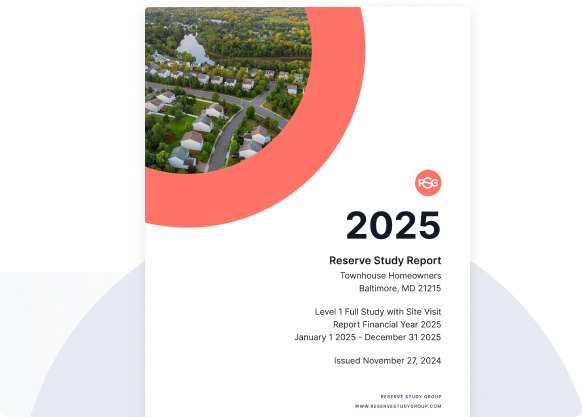

-- Reserve Study Requirements
Who needs a Reserve Study.
Washington law requires that all condominium and homeowner associations (HOAs) with significant assets conduct a reserve study—unless doing so imposes an unreasonable hardship.
How often do you need to update a Reserve Study.
Reserve studies must be updated annually, with a comprehensive visual site inspection by a reserve study professional at least every three years.
Additional Information
Associations may be exempt if they have ten or fewer units, if the cost of the study exceeds 5% of the annual budget, or if they lack significant assets.
Serving the Northeast
Serving the Great Lakes
Serving the Mountain
Serving the Southeast
Serving the Pacific West
Seattle
- 701 Fifth Ave
Suite 4200
Seattle WA 98104 - Phone: 888.315.2843
Fax: 888.316.4587
Email: mail@reservestudygroup.com


We focus on the detail and the big picture.
Our reserve study approach is simple. We provide you with the insight needed to make fast, accurate and informed decisions. We focus on understanding your situation and providing funding solutions that are designed with your goals in mind.
-- Reserve Study Requirements
Legislation
Washington State law requires both condominium and homeowners associations (HOAs) with significant assets to conduct and maintain a reserve study. Under RCW 64.34.380 (for condominiums) and RCW 64.38.070 (for HOAs), associations must perform an initial reserve study based on a visual site inspection by a qualified reserve study professional. The study must be updated annually, with a new comprehensive visual inspection required at least once every three years. These laws aim to ensure that associations are financially prepared for the long-term repair and replacement of major common elements. Associations may be exempt if the cost of the study poses an unreasonable hardship, such as in communities with fewer than 10 units or minimal common area assets.
-- Reserve Study
Our team of reserve study professionals works with associations throughout Washington State.

- Baltimore
- Baltimore
- Baltimore
- Baltimore
- Baltimore
- Baltimore
- Baltimore
- Baltimore
- Baltimore
- Baltimore
Frequently asked questions
Is a reserve study required in Washington?
Yes, Washington law requires reserve studies for most condo and HOA communities with significant assets, unless doing so imposes an unreasonable hardship.
How much do reserve studies cost?
Reserve studies in Washington typically cost between $2,500 and $10,000, based on property size and complexity.
How long does it take to do a reserve study?
A reserve study generally takes 2 to 6 weeks from site inspection to final report delivery.
How often should a condo association do a reserve study?
Reserve studies must be updated annually, with a full visual inspection every 3 years by a qualified professional.
Does Washington state regulate HOAs?
Yes, HOAs are regulated under the Washington Uniform Common Interest Ownership Act (WUCIOA) and statutes like RCW 64.38, which outline financial, governance, and reserve study requirements.
If you have any questions, our team of reserve study professionals will contact you immediately.







